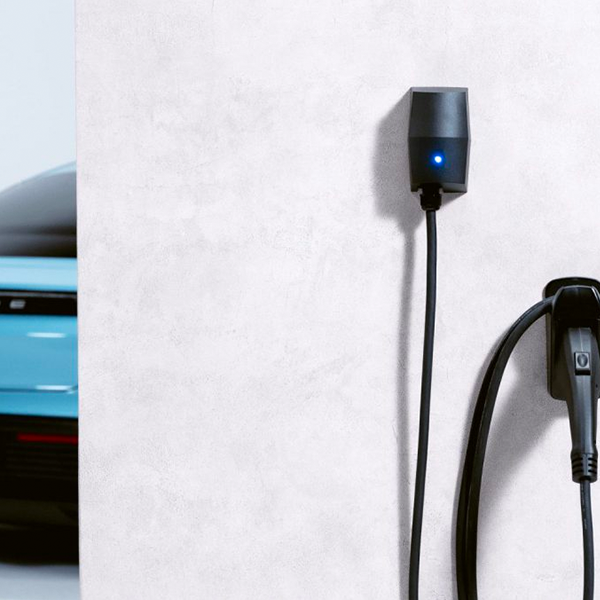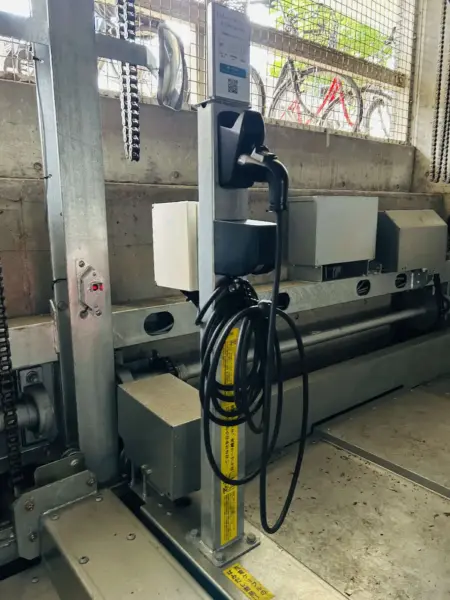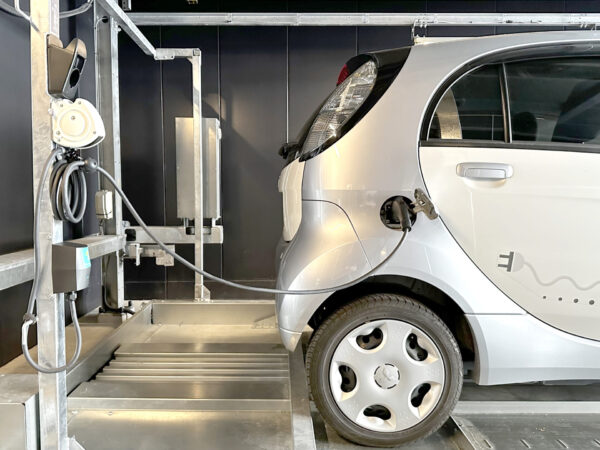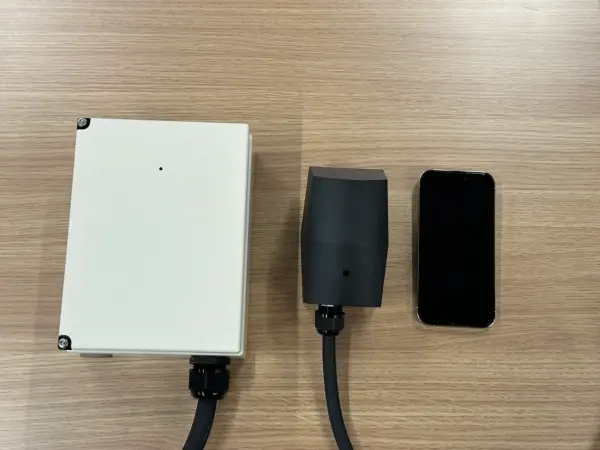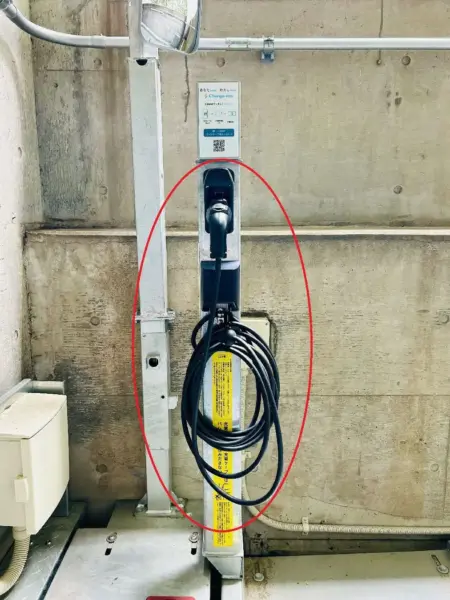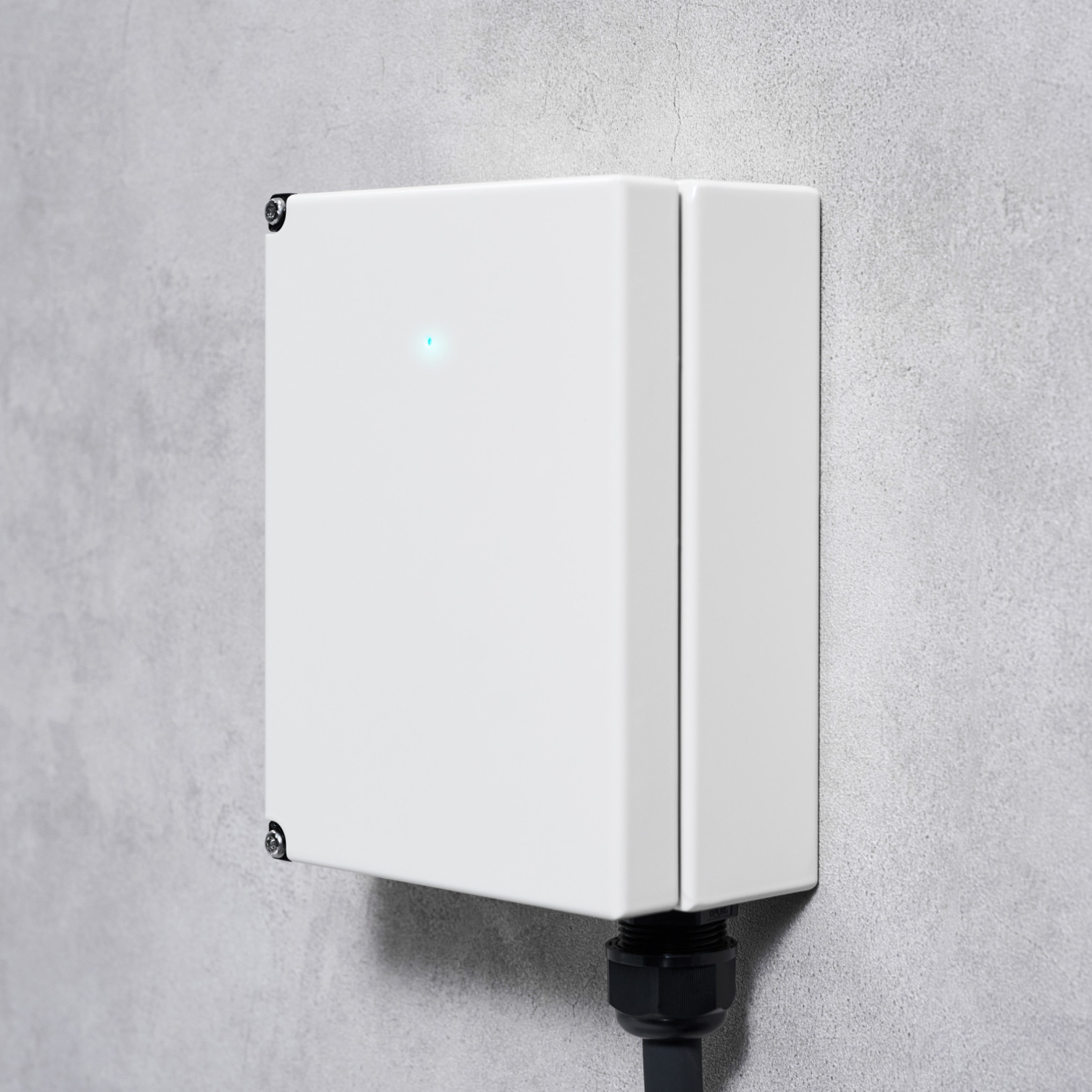EV charging waiting time can be reduced by up to 60% or more. Jigowatts’ high output regular chargers for EVs are installed by Kyokuto Kaihatsu Parking in its mechanical parking lots.
Significantly improved convenience for EV charging users and EV charger installation facilities
(Head office: Chuo-ku, Tokyo; Representative Director: Tomoki Shibata; hereinafter referred to as “Jigowatts”) (head office: Chuo-ku, Tokyo; President: Tomoteru Shibata; hereinafter “Jigowats”) has developed and is selling a high output type (up to 8 kW) EV charger with cable (EV chargers with cable are hereinafter referred to as “regular EV chargers”). The “industrial model” (“industrial model”), which is a high output type (up to 8kW) cable-equipped EV charger (Head office: Osaka City, Osaka; Representative Director: Yutaka Yoshida; hereinafter “Kyokuto Kaihatsu Parking”) on July 26, 2024. (Head office: Osaka City, Osaka; President: Yutaka Yoshida; hereinafter “Kyokuto Kaihatsu Parking”), installed in a mechanical parking lot. The spread of the installation of industrial models in mechanical parking lots will greatly improve convenience for both EV charging users and facilities that install EV chargers by reducing waiting time for recharging by up to 60%. The installation of the industrial model in mechanical parking garages is a major step toward the realization of a carbon-neutral society using EVs.
Background
Jigowatts is a venture company that is developing and marketing a high-performance, compact regular charger for EVs. Kyokuto Kaihatsu Parking is a manufacturer of mechanical parking facilities and also offers an EV charging management service called Charge-mo (“Charge-mo”). The company also operates the EV charging management service “Charge-mo” (“Charge-mo”), among others.
*1 As of July 2024, according to our own research.
Current Status and Issues
The recharging infrastructure environment is extremely important for the convenient use of EVs. And there are 3,259,679 mechanical parking spaces installed nationwide, with Tokyo having 800,376 spaces, or about 25% of the nation’s total. *2 Therefore, it is essential for mechanical parking lots to be equipped with EV chargers in order to realize a well-developed EV infrastructure environment.
However, the installation of EV chargers in mechanical parking lots is an important issue, as it is difficult to install EV chargers in mechanical parking lots due to pallet space issues and other factors. As a solution to these problems, charging cables (“cables”) The situation is such that outlet-type EV chargers (“outlet-type”), which do not have charging cables (“cables”), are often installed in mechanical parking lots. The outlet-type EV chargers are inexpensive (several thousands of dollars), and are often installed as a solution to these problems. Outlet-type EV chargers are inexpensive (several thousand yen) and have the great advantage of being installed with little burden on the installer. However, the outlet type has the following issues
*2 (“Parking Handbook 2022” (survey by the Multi-level Parking Industry Association): http://cus4.japan-pa.or.jp/wp/wp-content/uploads/2023/01/99e936f393cdf240bd5f8c34420ab51d.pdf)
JIGO WATTS and Kyokuto Kaihatsu Parking have been jointly promoting a project to install regular EV chargers in mechanical parking lots (the “Project”) for the purpose of improving convenience for EV charging users and for the facilities where EV chargers are installed. The first phase of the Project was completed in 2023.
As the first step of the Project, “Ella,” Japan’s smallest*1 EV normal charger (“Ella”), was installed in a mechanical parking lot in July 2023. ) was installed in a mechanical parking lot (see: https://jigowatts.jp/news/400/). And as the second phase, an industrial model was installed in a mechanical parking lot on July 26, 2024.
1. The hassle of bringing cables: EV charging users must bring their own cables in order to use the EV chargers. If they forget the cables, they will not be able to charge their vehicles. In addition, EV charging is often done outdoors, and there are many situations where the cables become dirty due to rain or dust. If an outlet type is installed, EV charging users need to put the dirty cable in the trunk or clean the cable, which is more than 4 m long each time, and carry it in the trunk.
2. Charging takes time: The output of the outlet type is generally around 3.0 kW, and charging takes time.
3. Unable to control output: Outlet-type chargers only have an on/off function and cannot control output (control kW), making it difficult to optimize power and charging time. This makes it impossible to charge all installed EV chargers at the same time due to their electrical capacity, and users need to make reservations to use EV chargers, etc.
4. Uniform cable length and charging plug dimensions: When EV chargers are installed in mechanical parking lots, it is necessary to consider not only the size of the EV charger itself, but also the length of the cable and the dimensions of the charging plug that protrudes from the car body. However, cable lengths and charging plugs vary by cable manufacturer. Therefore, depending on the cable brought by the EV charging user, there is a possibility of accidents involving the cable or charging plug protruding from the pallet.
Advantages of Installing an Industrial Model
The installation of industrial models offers the following advantages to EV charging users and EV charger installation facilities.
(Advantages for EV charging users)
Chargers with cables: EV charging users do not need to bring their own cables; they can simply plug the cables provided with the industrial model into their vehicles.
2. Reduced charging waiting time: With an output of up to 8 kW, the industrial model can charge at a rate up to approximately 2.6 times faster than an outlet-type charger (3.0 kW). This also reduces the waiting time for EV charging users by up to 60% or more. *3.
3. No need for reservations: All EV chargers can be operated at the same time by controlling the system. This eliminates the need for reservations when using EV chargers, and can be used simply by plugging the cable into the car.
*3 Since the output of industrial models varies depending on the installation location, the maximum output of 8 kW is not always guaranteed.
(Advantages on the side of EV charger installation facilities)
1. Output control function: The output control function allows the output of the charger to be adjusted according to the supply and demand of electricity. This allows power and charging times to be optimized. For example, output can be increased during times when electricity capacity is available and output can be reduced during times when electricity capacity is not available, enabling efficient recharging while ensuring the stability of the electricity supply. In this way, the output control function can be expected to reduce electricity costs and environmental impact.
2. System interlocking: The system can be interlocked with various systems. For example, by interlocking with solar power generation, etc., carbon-neutral charging can be achieved, contributing to the reduction of CO2 emissions.
3. Expandability: Industrial models are always connected to the server when communicating, so if the system is changed or modified, various functions can be added without additional work.
4. Uniform cable length and charging plug dimensions: Industrial models have uniform cable lengths and charging plugs, enabling stable operation.
Technical value of this project
The reason why outlet-type chargers have been installed in the past is that, in addition to the low cost of outlet-type chargers, it is technically difficult to install regular EV chargers. In particular, the size of the regular EV charger, the handling of cables, and its operational management were major issues. In this project, these issues were resolved as follows.
(Regarding the size of the regular EV charger)
In mechanical parking lots, the space available for installation is small, and there are few EV chargers of a size that can be installed in that space. In particular, high-power chargers tend to be large. The EV chargers developed and sold by Jigowatts are the Ella and industrial models, both of which are compact enough to be installed in mechanical parking lots.
(Handling of EV charger cables)
The cables of ordinary chargers for EVs are several meters long, and depending on how users handle the cables, there is a possibility that the cables may get caught when the pallets are moved.
Therefore, Kyokuto Kaihatsu Parking has introduced a system to manage the cables using reels. This prevents cable entanglement and damage and simplifies user operation.
(About the management)
Since Charge-mo, operated by Kyokuto Kaihatsu Parking, is used, the installer of the charger can install the system with peace of mind, eliminating the need for debt collection, etc. In addition, since Kyokuto Kaihatsu Parking also provides parking lot management services, the introduction of Charge-mo enables the operation and management of EV chargers in tandem with parking lot management.
Summary and Outlook
This project has demonstrated that Ella and industrial models can be installed in mechanical parking garages. Taking this opportunity, JIGO WATTS and Kyokuto Kaihatsu Parking will actively promote the installation of Ella and industrial models in mechanical parking facilities.
On the software side, on July 17, 2024, Jigowatts’ PIYO CHARGE service for EV charging and Charge-mo agreed to begin mutual use collaboration by the first half of 2025 (see: https://jigowatts.jp/news/550/).
JIGOWATZ and Kyokuto Kaihatsu Parking will continue to cooperate from both hardware and software perspectives to provide a more convenient and comfortable charging environment for EV charging users, EV charger installation facilities, and society.
Jigowatts Building, 2-3-3 Nihonbashi Bakurocho, Chuo-ku, Tokyo
CONTACT US
